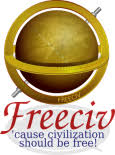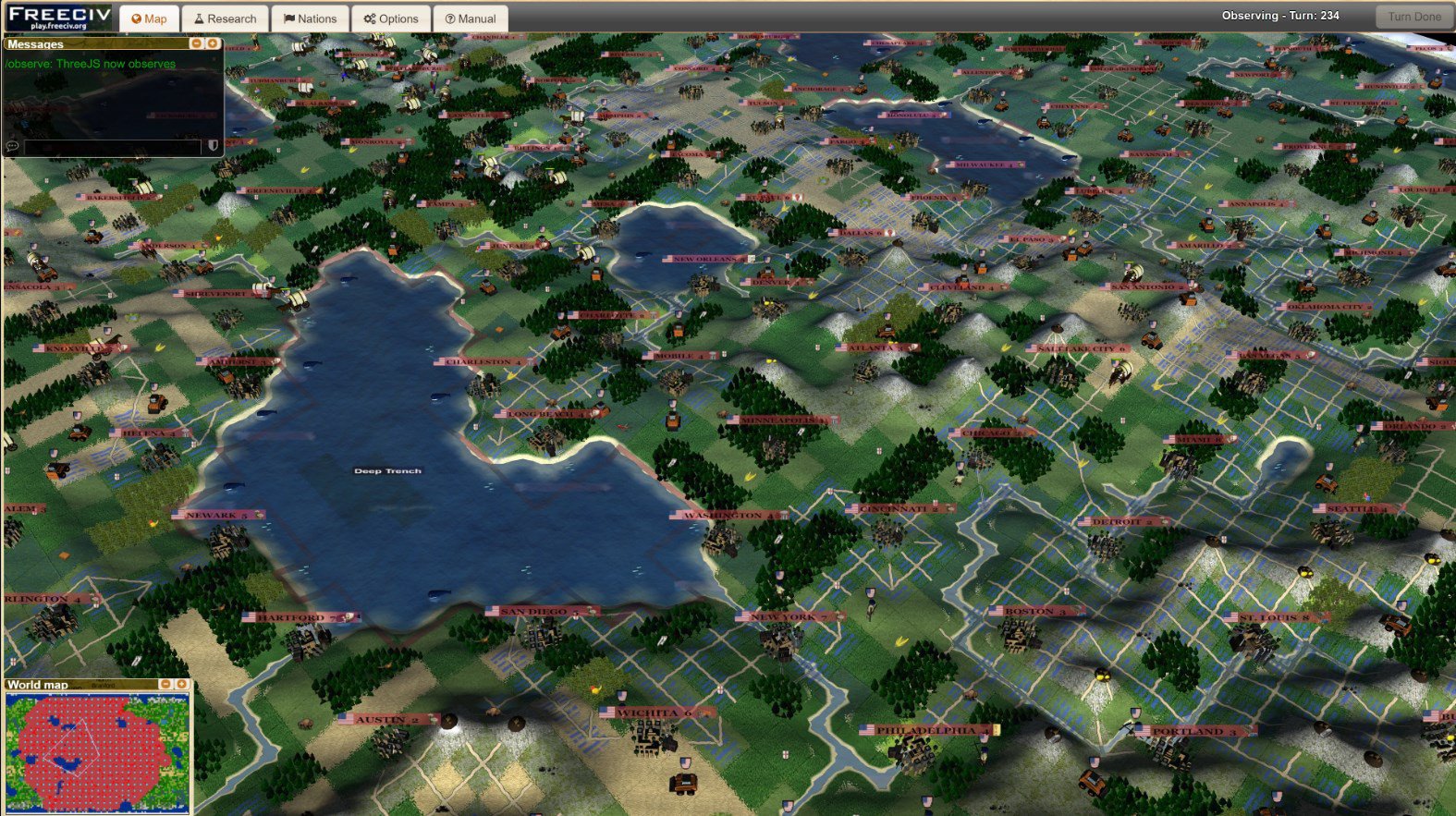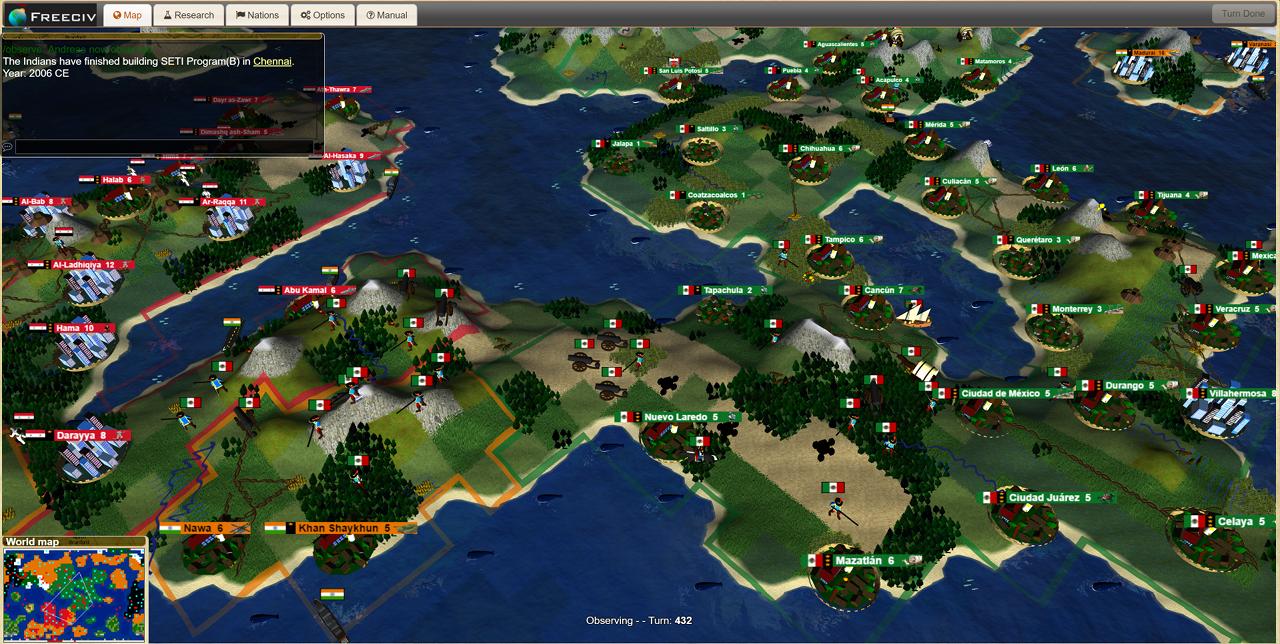Search
[{{{type}}}] {{{reason}}}
{{/data.error.root_cause}}{{{_source.title}}} {{#_source.showPrice}} {{{_source.displayPrice}}} {{/_source.showPrice}}
{{#_source.showLink}} {{/_source.showLink}} {{#_source.showDate}}{{{_source.displayDate}}}
{{/_source.showDate}}{{{_source.description}}}
{{#_source.additionalInfo}}{{#_source.additionalFields}} {{#title}} {{{label}}}: {{{title}}} {{/title}} {{/_source.additionalFields}}
{{/_source.additionalInfo}}- Details
- Category: Computer
- By Daniel Cullen
- Hits: 2492
Freeciv (PC)

Freeciv
Developed By: The Freeciv project
Published By: The Freeciv project
Released: January 5, 1996
Available On: Linux, macOS, Microsoft Windows
Genre: Simulation, Edutainment
ESRB Rating: Not rated
Number of Players: Singleplayer, Multiplayer
Price: Free and open-source
Note: This review is based on the 2.6.4 build of Freeciv, primarily played on the Qt-based client on Windows and Linux. Other clients and features specific to them will be covered in the overview, but a detailed breakdown would require more detail that is better covered in their documentation and on their official wiki. This game is still being constantly updated and does not cover the web-browser-only version, which has several technical differences.
It's said that the best things in life are free. For fans of the classic Sid Meier's Civilization world nation simulator franchise, that would be the case with Freeciv. It's a free, open-source game that attempts to inherit the mantle of addictive world leader simulation gaming that made the Civilization series such an addictive game for many.
Like the Civilization series, you assume leadership of a real-world civilization like the Mayans, Americans, and so on. In this capacity, you oversee the growth and development of that civilization from the Stone Age to the contemporary future. You are given control over the growth of its land and cities. it's technology advances and can conduct war, peace, and trade with other civilizations, which can be allies or rivals.
Graphically. the Freeciv games offer a wide variety of official and mod oriented tilesets and interfaces, ranging from one like Civilization 1's overhead square tiles and early gray interface, more modern ones like the Civilization 2 isometric look, and an even more contemporary interface with more detailed menus and animations, or even Civilization III or later style 3D hexagonal maps and oriented sprites based on the player direction of movement. For a free and open-source game, the art for each is true to the games they attempt to be similar to and all have distinct and stunning choices for color and art direction.

Strong Points: Excellent adaptation of the Civilization games to an open-source clone
Weak Points: Steep learning curve depending on the client interface
Moral Warnings: RPG style violence; options to break treaties and otherwise be treacherous in dealing with other nations
Three main "clients", or interfaces, are available for most supported operating systems. The GTK client is the most traditional-looking interface resembling the classic Civilization games (I and II). The SDL client resembles Civilization games from Civilization III and later period, and the Qt client is a mix of traditional and modern. The same games can be played on all three clients, though each has some differences in control key mapping, layouts, and interface design.
Sounds and music remain the same across clients, generally focusing on instrumental soundtracks using a variety of traditional instruments like flutes, horns, and piano. Music is by default not heard except when starting the game, though the included mod manager allows the use of different sounds and music. Sounds are typically appropriate to units or actions, like a marching sound for an infantry unit, a gunshot for a firearm attack, and so on.
Controls tend to have some minor differences depending on the client. Each one has slightly different key mappings and mouse control. It is highly recommended in the official documentation to familiarize yourself with the controls and use the client most adaptable to your needs. I found the Qt client most adaptable for me, but the others may be more suitable for other players.
Stability is generally excellent. Both single-player (with and without artificial opponents) are supported, as is multiplayer via the internet. There is a bit of a waiting period before starting a game, as the engine attempts to assemble all the selected options for a new game and load it all into memory that can be annoying, but once a game is loaded, the amount of time needed for loading is practically nonexistent. Provided the player has a good internet connection, multiplayer games via local connections or with players around the world are easy to sync with.

Higher is better
(10/10 is perfect)
Game Score - 82%
Gameplay - 17/20
Graphics - 8/10
Sound - 6/10
Stability - 5/5
Controls - 5/5
Morality Score - 90%
Violence - 7/10
Language - 10/10
Sexual Content - 10/10
Occult/Supernatural - 10/10
Cultural/Moral/Ethical - 8/10
The game has robust support for further modification (including a service to download community mods already configured for use) and the source code is fully available down to the last line, under very permissive open licensing, so any player who wishes to configure the game for their personal needs may do so at any time. The official documentation tends to be fairly comprehensive and the requirements for running this program are incredibly modest for even low-end laptops and desktops.
Morally, being based on the Civilization games, particularly drawing from the first two, it has some issues.
Violence is of the "give orders and watch it happen" variety, with animated units carrying out attack orders. Defeated units disappear from the field, and there is no blood and gore depicted. Language is practically nonexistent in normal play, though online interactions may result in strong language between players. By default, however, the language remains clean.
Sexual content is nonexistent. Supernatural content is nonexistent, and religious content is purely rooted in historical information, with religion serving a generic in-game benefit to maintaining the happiness of your civilization. No blasphemous references or comments exist in the regular gameplay concerning any religious faith or lack thereof.
Morally and ethically, you are placed in the position of being a world leader, and you must help your civilization prosper. You can choose to do so as bloodlessly or violently as you choose. Myself, I tended towards diplomacy and trade, though waging war (aggressively or merely defensively) remains a perfectly valid option. One may honor or break treaties and alliances at their discretion, and diplomacy may be done in good faith or can be undercut by sabotage and espionage by all, the player included. How morally or immorally the player conducts their civilization is entirely in their hands.
I'll admit I still believe Civilization II was one of the best of the early Civilization games, and Freeciv still is not as good as that game in some areas. At the same time, Freeciv more than stands on its own as a perfectly viable alternative with unique virtues specific to how they decided to make a civilization simulator, with far more extensive modding capabilities being a standout feature. Throw in the fact it's entirely free, and if you want to play games that satisfy the itch for classic civilization-building, and Freeciv is a great way to blow away the day making your civilization prosper.






